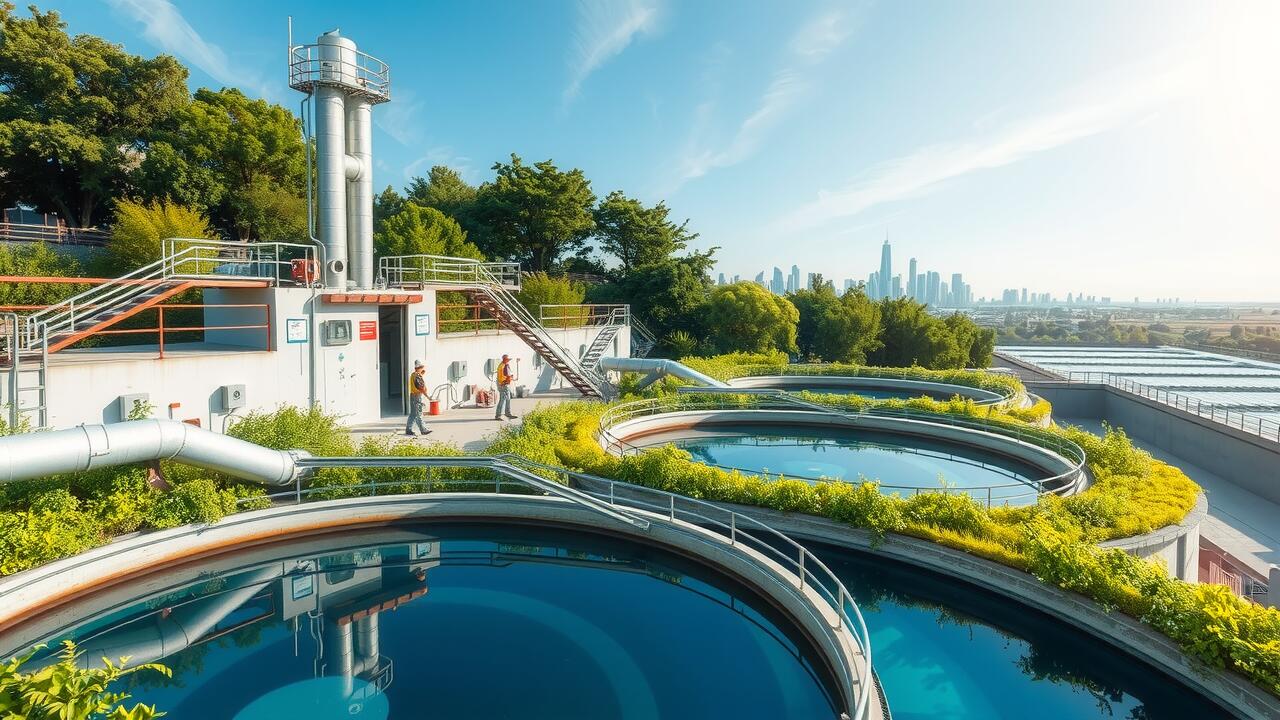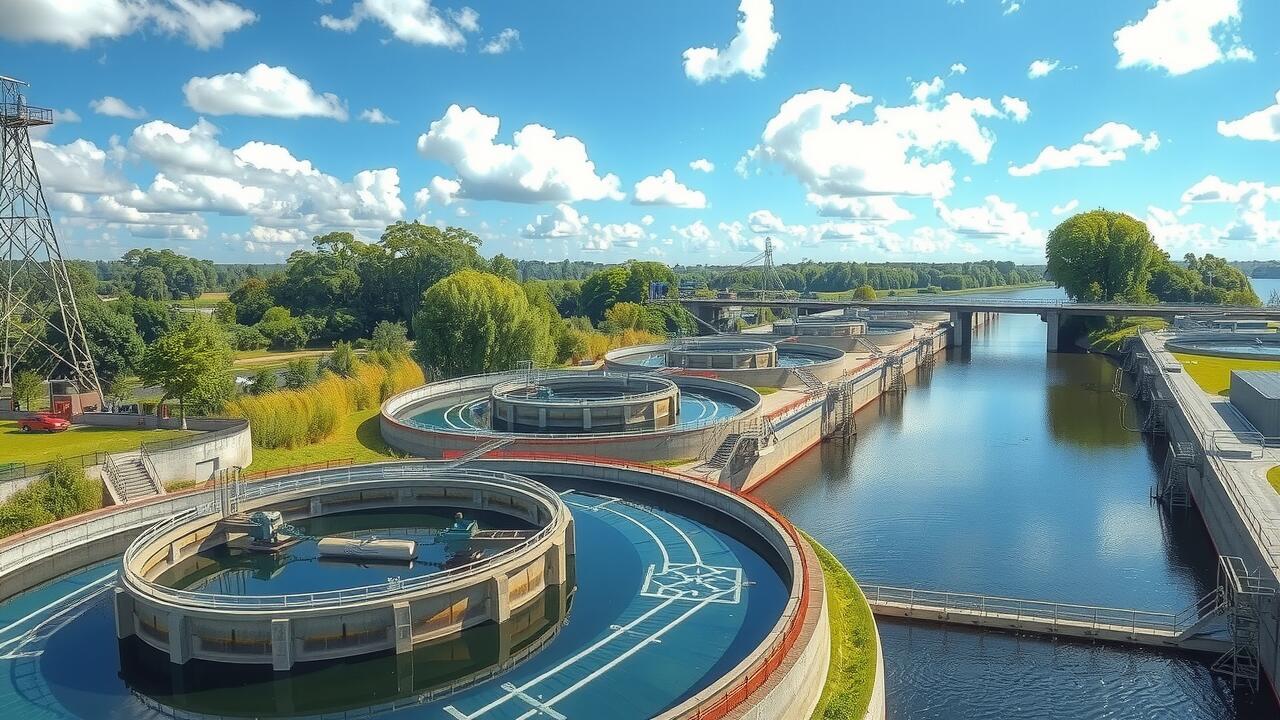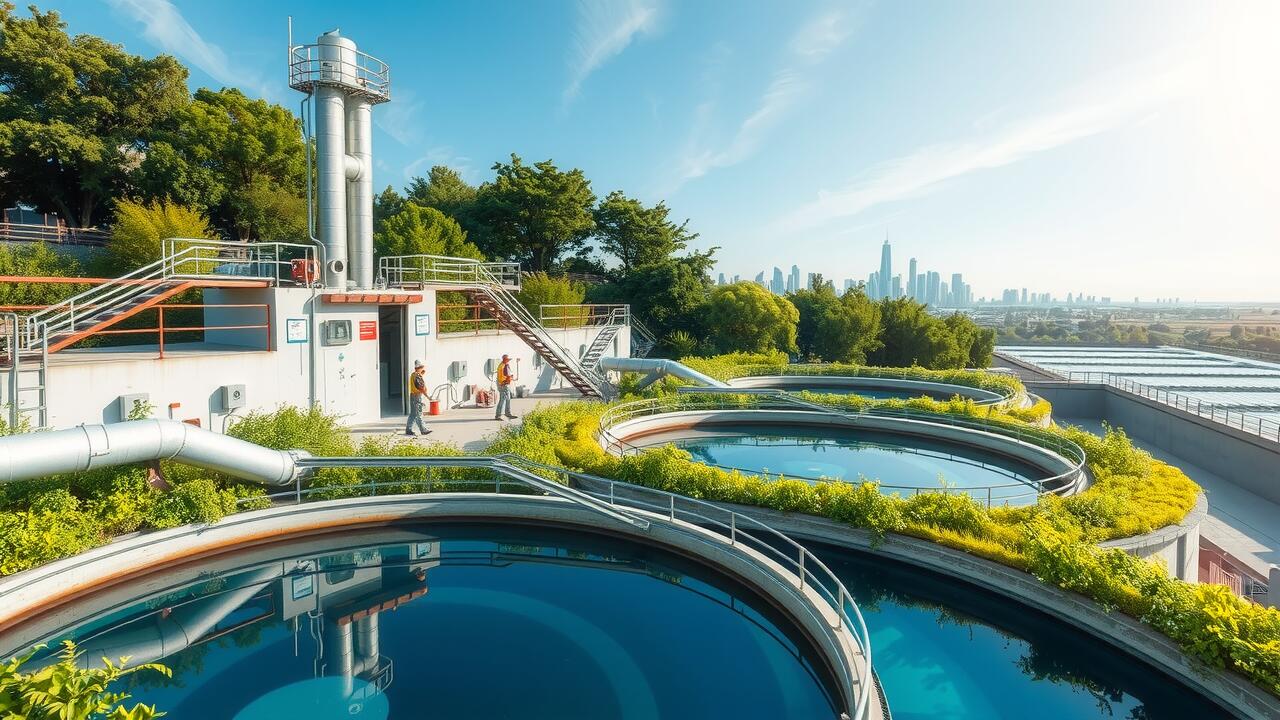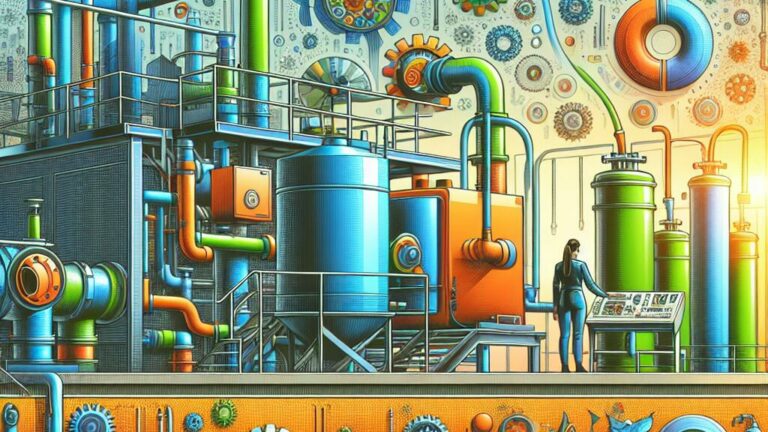Wastewater Treatment Experts | Clean Water Through Innovation
The expertise of wastewater treatment professionals is crucial in advancing the field of water and wastewater treatment. These Wastewater Treatment Experts focus on innovative solutions for managing both municipal and industrial wastewater. Advanced wastewater treatment systems are developed to optimize the treatment of wastewater, ensuring that treated wastewater meets safety and environmental standards. The efficiency of wastewater treatment facilities relies on accurate monitoring and the implementation of best practices in wastewater management. By utilizing cutting-edge technology, these experts contribute to cleaner water resources and foster sustainable practices in water reuse across various sectors. The synergy of innovative techniques and expert knowledge is vital for the continuous evolution of effective wastewater treatment processes.
Wastewater Treatment Experts | Clean Water Through Innovation | The Importance of Wastewater Management
Effective wastewater management is crucial for ensuring public health and environmental sustainability. Wastewater treatment experts utilize various techniques to address the challenges associated with the treatment of municipal wastewater and industrial wastewater. Strategies such as biological wastewater treatment and decentralized wastewater treatment play vital roles in minimizing the volume of untreated wastewater entering ecosystems. Wastewater treatment plants have become a cornerstone in this endeavor, working tirelessly to convert wastewater into clean water that meets safety standards.
The importance of clean water and sanitation cannot be overstated in today’s society. Wastewater surveillance is essential for monitoring the quality and safety of treated wastewater, ensuring that communities receive clean water free from contaminants. Wastewater treatment experts continuously innovate to improve the efficiency of wastewater treatment plants, making strides toward better management practices. This ongoing effort contributes to a more sustainable future where clean water is accessible to all.
- Enhance public health by reducing waterborne diseases
- Protect natural ecosystems from pollutants
- Promote water reuse and recycling initiatives
- Support economic development through reliable water supply
- Foster community awareness and engagement in water conservation
- Drive research and development in wastewater technologies
- Collaborate with governmental and non-governmental organizations for improved policies
Overview of Water and Wastewater Treatment Processes
Water management is crucial for ensuring cleaner water is available for both consumption and environmental health. Wastewater treatment experts focus on processes that adhere to the Clean Water Act, which aims to reduce water waste in sewage systems. These processes typically include various stages of water treatment that transform raw sewage into clean drinking water. The importance of effective sewage treatment cannot be overstated, as it directly impacts public health and the quality of water and sanitation services.
Processes for water recycling and water reusing encompass a wide range of technologies designed to reclaim water for various applications. Advanced methods facilitate water reclamation, making it possible to repurpose treated sewage for irrigation, industrial uses, and even replenishing aquifers. Wastewater treatment experts emphasize the role of innovation in developing these systems, which are essential in addressing the growing global demand for clean water. By enhancing water treatment practices, communities can secure a sustainable water future while minimizing environmental impact.
Types of Wastewater Treatment Systems
Wastewater treatment systems are essential for mitigating water pollution and enhancing water efficiency in various sectors. These systems employ advanced techniques to purify contaminated water, transforming it into reclaimed water suitable for multiple applications. Wastewater Treatment Experts leverage technology to innovate in sewage sludge treatment and water purification processes, ensuring that recycled water meets standards for potable use. The ability to reclaim water not only supports fresh water conservation efforts but also promotes effective waste management practices. Through these innovations, communities can benefit from clean water through innovation, ultimately facilitating water reuse and sustainability initiatives.
Traditional Wastewater Treatment Methods
Municipal water management relies heavily on traditional wastewater treatment methods to ensure clean water is returned to the environment. Wastewater treatment experts focus on optimizing these practices to achieve maximum efficiency and sustainability. Through the integration of established processes such as sedimentation, biological treatment, and filtration, the wastewater treatment industry addresses the need for effective contaminant removal. These foundational techniques lay the groundwork for innovative wastewater treatment solutions that enhance overall system performance.
The evolution of traditional methods has paved the way for contemporary practices in the water sector. Innovative wastewater treatment approaches are being implemented alongside established methods, providing a multifaceted solution to wastewater challenges. Wastewater treatment companies are embracing modern wastewater treatment technologies to improve operational capacity while minimizing environmental impact. This synergy between traditional and innovative techniques fosters sustainable wastewater treatment, ensuring clean wastewater that meets regulatory standards and supports public health.
| Treatment Method | Description | Advantages |
|---|---|---|
| Sedimentation | The process of settling solids out of wastewater by gravity. | Simple, cost-effective, and requires less energy compared to other methods. |
| Biological Treatment | Utilizes microorganisms to break down organic matter in wastewater. | Highly effective for organic pollutant removal and can be sustainable with proper management. |
| Filtration | The process of passing wastewater through filters to remove solids and impurities. | Improves water clarity and quality; can be adapted for different contaminant types. |
| Infiltration | Reintroduces treated wastewater into the groundwater system through soil layers. | Enhances groundwater recharge and reduces surface water pollution. |
Advanced Wastewater Treatment Technologies
The advancement of wastewater treatment technologies represents a significant leap in the wastewater treatment sector. Innovative approaches such as membrane bioreactors and advanced oxidation processes enable wastewater treatment experts to achieve cleaner effluents while addressing the challenges posed by traditional wastewater treatment methods. These leading wastewater treatment options not only enhance the quality of treated water but also contribute to sustainable wastewater management practices. With a focus on achieving clean water through innovation, these technologies provide effective community wastewater treatment solutions.
Emerging wastewater treatment technologies play a crucial role in optimizing resource recovery and minimizing environmental impact. By integrating smart sensors and automation, facilities can monitor and manage wastewater with greater efficiency. This fosters a more robust and responsive wastewater management solution, ensuring compliance with environmental regulations. The ability to harness cutting-edge wastewater treatment technology allows for improved performance and reliability, transforming the future of the wastewater treatment sector and paving the way for more resilient ecosystems.
The Role of Wastewater Treatment Plants
Wastewater treatment plants play a crucial role in the efficient management of wastewater, ensuring that clean water is returned to the environment. Wastewater treatment experts utilize various methods to treat wastewater, employing innovative approaches to enhance efficiency. Early wastewater management practices laid the foundation for modern systems, which now include modular wastewater treatment options tailored to specific community needs. The integration of alternative wastewater technologies showcases the sector’s commitment to sustainability, while ongoing wastewater analysis helps optimize performance. A robust wastewater management system is vital for utilities, underscoring the importance of staying informed about wastewater management facts and advancements in wastewater technology.
Design and Functionality of Wastewater Treatment Plants
Wastewater treatment plants are designed to efficiently manage multiple wastewater streams, ensuring that varying wastewater characteristics are addressed effectively. Wastewater treatment experts employ various wastewater technology to handle mixed wastewater, including hot wastewater sources. Through innovative water treatment processes, these facilities transform pollutants into purified wastewater that meets environmental safety standards. This structured approach reflects the principle of sustainable wastewater infrastructure, aiming for resource recovery and minimizing wastewater emissions.
Functionality within these treatment plants relies heavily on adopting a range of treatment methods that cater to the specific needs of the community. Distributed wastewater treatment options are increasingly popular as they allow for localized processing, reducing the demand on centralized systems. Water innovation plays a critical role in enhancing the efficiency of treatment processes, enabling better handling of diverse wastewater challenges. Wastewater Treatment Experts | Clean Water Through Innovation are at the forefront of implementing these advancements, striving for optimal functionality in wastewater management systems.
| Treatment Method | Description | Advantages |
|---|---|---|
| Activated Sludge Process | A biological treatment method using aeration to promote microbial growth that decomposes organic matter. | Effective for high-strength wastewater, relatively simple to operate. |
| Membrane Bioreactor (MBR) | A combination of biological treatment and membrane filtration, allowing for the separation of solids from liquids. | High-quality effluent, smaller footprint for installation, excellent for reuse applications. |
| Constructed Wetlands | Utilizes natural processes in wetland ecosystems to treat wastewater through filtration and microbial action. | Low energy costs, enhances biodiversity, provides aesthetic benefits. |
| Sequencing Batch Reactor (SBR) | A batch process that treats wastewater in a single tank where aeration and sedimentation occur sequentially. | Flexible operation, effective for variable influent flows, and good treatment efficiency. |
Monitoring and Maintenance of Treatment Facilities
Effective monitoring and maintenance are crucial for ensuring the smooth operation of wastewater treatment facilities. Wastewater Treatment Experts focus on innovative strategies to handle varying wastewater volumes, including residential sewage water and industrial discharges. By employing clean water technology, facilities can implement wastewater filtration systems that safeguard the environment and public health. This approach enhances the efficiency of water treatment efforts and helps meet stringent wastewater discharge regulations.
Implementing wastewater surveillance programs is essential for proactive maintenance and monitoring. These programs enable the assessment of individual wastewater streams, identifying potential issues before they escalate. U.S. wastewater surveillance initiatives help track contamination trends, ensuring that clean water solutions are developed and maintained. By fostering scale water innovation, treatment facilities can consistently provide high-quality treated water, contributing to broader community health and sustainability goals.
The Process of Treating Wastewater
Effective wastewater treatment combines the expertise of wastewater treatment experts with innovative technologies focused on clean water through innovation. This process involves a multi-stage approach to tackle wastewater contaminants, transforming municipal sewage into treated water suitable for various applications. Advanced water purification techniques, such as those utilized in the San Marcos wastewater facilities, highlight the importance of sustainable water management. Projects like Wastewaterscan demonstrate the potential for complex water treatment solutions, ensuring that water reuse and recycling become integral components of an innovative water sector. By prioritizing these methods, communities can enhance their process water quality while contributing to environmental conservation efforts.
Primary, Secondary, and Tertiary Treatment Stages
The primary treatment stage focuses on the physical separation of solid materials from wastewater. This initial process enhances water treatment capacity and sets the foundation for subsequent stages. Wastewater Treatment Experts implement techniques to remove sediments and floating materials, ensuring pre-existing water treatment performs efficiently. By adhering to water recycling standards, this stage significantly improves raw water quality before further processing.
The secondary treatment stage employs biological processes to remove dissolved organic matter. This crucial stage not only advances water quality management but also optimizes distinct water treatment practices. Advanced water reuse technology plays a pivotal role in enhancing the effectiveness of this stage. Water utilities rely on these processes to achieve potable water reuse, aligning with water reuse policies that promote critical water efficiency and sustainable water solutions for the community.
Innovations in Wastewater Treatment
Innovative solutions are transforming the landscape of wastewater management. Wastewater Treatment Experts are focusing on modular water treatment systems that enable decentralized wastewater treatment. These systems enhance water infrastructure health by utilizing underutilized water sources. By integrating water-focused technologies, these innovations are significantly improving potable water quality while also reducing water use. The emphasis on zero water waste aligns with broader water conservation efforts, demonstrating a commitment to sustainable practices.
Colleges, industries, and municipalities are adopting various water reuse applications, ensuring efficient use of treated wastewater. Advanced water sector technologies are enabling treatment professionals to design systems that cater to specific needs. Emphasizing the importance of clean water through innovation, experts are pioneering approaches that not only address current demands but also promote long-term sustainability. By harnessing these innovative water reuse approaches, communities can transform their relationship with water and secure resources for the future.
- Innovative modular systems allow for decentralized wastewater treatment.
- Integration of advanced technologies improves the efficiency of water treatment processes.
- Emphasis on zero water waste contributes to broader conservation goals.
- Various sectors are adopting water reuse applications to maximize efficiency.
- Treatment solutions are tailored to meet specific community needs.
- Innovations promote long-term sustainability in water management.
- Communities can enhance their water resource security through these advancements.
Reuse of Treated Wastewater
The integration of treated wastewater into various applications showcases the expertise of wastewater treatment experts committed to clean water through innovation. With stringent water quality regulations guiding the process, these systems enable water reuse that addresses urban water pollution effectively. This pioneering approach to water conservation presents substantial water conservation solutions, as treated wastewater contributes to sustainable water production. Recommended water reuse practices help improve water quality, making it suitable for irrigation, industrial processes, and even potability in some regions. As the new water sector continues to evolve, integrating organic waste management into treatment processes ensures that reclaimed water meets the necessary standards for safe use, reinforcing the significance of advanced water reclamation strategies.

Applications for Treated Wastewater
Treated wastewater offers a range of applications that significantly contribute to water conservation efforts. Wastewater Treatment Experts emphasize the potential of using reclaimed water for irrigation in agriculture and landscaping. This practice helps reduce demand on potable water supplies while ensuring that plants receive the necessary hydration. By implementing water supply projects that incorporate treated wastewater, communities can address strict water pollution regulations and foster sustainable practices that enhance fresh water supplies.
Regenerative water reuse systems are gaining traction in urban settings, particularly for non-potable uses such as toilet flushing and industrial cleaning. These innovative solutions align with water infrastructure investments aimed at improving quality water access. Nutrient removal projects integrated into wastewater treatment processes can further enhance the usability of treated water. The adoption of stable water reuse methodologies ultimately paves the way for a resilient future where communities can wash away water scarcity challenges with clean, reliable resources.
Benefits of Water Reuse in Various Sectors
Water reuse offers substantial benefits across various sectors by promoting sustainable practices and reducing the demand for freshwater resources. Wastewater Treatment Experts emphasize the importance of clean water through innovation, utilizing advanced systems that can extract valuable materials like nutrients and produce high-quality reusable water. Technologies such as nutrient removal technology enhance the capacity of water tech to regenerate and purify, ensuring that product water meets stringent standards for different applications. Companies engaged in international water reuse initiatives highlight the potential for washing agricultural produce and supplying industries with recycled water.
Many sectors can capitalize on the cost-effective advantages of treated wastewater. FCT water treatment provides solutions that not only assess water quality but also enable the implementation of practices that conserve water resources. The integration of reusable water into irrigation systems, industrial processes, and even municipal uses demonstrates the versatility of recycled water. As water scarcity becomes a growing concern, the collaboration between wastewater treatment experts and innovative technologies continues to drive efficient and sustainable water management solutions.
Cost-Effective Wastewater Treatment Solutions
Cost-effective wastewater treatment solutions focus on maximizing efficiency while minimizing expenses. Wastewater Treatment Experts prioritize innovative practices that support clean water through innovation, ensuring better management and reclamation of resources. Techniques such as onsite water reuse not only reduce water consumption but also enhance the sustainability of water systems. Modern sanitation measures have evolved alongside technologies for water quality monitoring, which include advancements in modern water monitoring. These innovations play a pivotal role in applications like covid-19 wastewater surveillance, allowing for real-time assessments of community health. The aquapreneur innovation initiative fosters sustainable projects that yield a strong return on investment, making it possible for municipalities and industries alike to become proactive water offenders in the pursuit of environmental stewardship and portable water accessibility.

Conclusion
The insights provided by Wastewater Treatment Experts | Clean Water Through Innovation highlight the crucial role of sophisticated water technology in enhancing our water systems. Innovations in gray water treatment and sustainable disposal methods allow water-focused entrepreneurs to create solutions that ensure high-quality water is available for diverse applications. Effective water quality checks are integral to maintaining safety standards, while companies like Evoqua Water Technologies lead the charge in advancing these crucial practices. As communities embrace the importance of water rights and the reuse of treated wastewater, it becomes clear that collaboration and innovation drive progress in the evolving water technology landscape.
FAQS
How does wastewater treatment technology contribute to cleaning water in municipal wastewater treatment facilities?
Wastewater treatment technology plays a crucial role in the effectiveness of municipal wastewater treatment facilities by implementing innovative wastewater treatment methods. These advanced systems enable water reuse and help address water reclamation, significantly improving water quality. By utilizing various wastewater treatment practices, such as decentralized water treatment, facilities can reduce water consumption and enhance their capacity for monitoring water quality. This not only results in cleaner water but also contributes to a more sustainable wastewater sector, as evidenced by successful initiatives like the Wastewaterscan project in New York wastewater operations.
What are the benefits of partnering with a wastewater treatment company for industrial wastewater treatment projects?
Partnering with a wastewater treatment company for industrial wastewater treatment projects can significantly improve water quality and enable water reuse through advanced systems that extract valuable materials like nutrients and clean water. These systems not only enhance the efficiency of cleaning water but also contribute to pioneering water conservation efforts, reduce water consumption, and provide a strong ROI for water purification projects. Wastewater utilities can leverage the latest wastewater technology facts to ensure high water quality, demonstrating the many ways water can be reused effectively in various processes.
How do advanced systems in wastewater treatment enable water reuse and improve water quality?
Advanced wastewater treatment systems enable water reuse by recycling process wastewater, which significantly improves water quality. These systems can extract valuable materials like nutrients and clean water, thereby reducing water consumption and achieving a strong ROI for water management initiatives.
What are some important facts about wastewater treatment and how it can enable water reuse while improving water quality?
One significant wastewater treatment fact is that advanced systems can extract valuable materials like nutrients and clean water, which in turn enables water reuse and leads to improved water quality. Additionally, these systems help reduce water consumption, which is crucial for sustainable water management. Investing in such technologies can also yield a positive ROI water outcome, making it a smart choice for organizations focused on efficiency and sustainability.
How does reciprocal wastewater treatment help in reducing water consumption in various applications?
Reciprocal wastewater treatment processes are designed to effectively treat and recycle water, which significantly reduces water consumption. By utilizing innovative techniques, these systems provide a sustainable solution for industries and municipalities, allowing them to make the most of their water resources while ensuring that treated water meets quality standards for reuse. This approach not only minimizes the demand for fresh water but also promotes environmental stewardship by lowering the overall water footprint.







